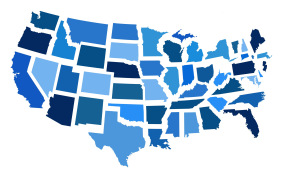 While the industry waits for Title III crowdfunding rules to be released, the intrastate crowdfunding movement continues to move forward (as a whole). Here is a brief update as to the status of the enactment/use of intrastate crowdfunding exemptions in certain states.
While the industry waits for Title III crowdfunding rules to be released, the intrastate crowdfunding movement continues to move forward (as a whole). Here is a brief update as to the status of the enactment/use of intrastate crowdfunding exemptions in certain states.
TEXAS – Lucky Number 13
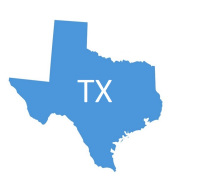
On October 22, 2014, Texas became the thirteenth, and largest state, to enact an intrastate crowdfunding exemption when the Texas State Securities Board (the “TSSB”) voted to formally adopt its proposed intrastate crowdfunding exemption (Rules 115.19 & 139.25).
There does not appear to be any material changes in the final rules from the “proposed rules” issued May 9, 2014. As intrastate crowdfunding rules go, the final Texas rules are pretty conservative overall (e.g. $1,000,000 offering cap, $5,000 non-accredited person investment cap, etc.). That being said, the expectation is that the new exemption will be highly popular among companies in the real estate and energy (oil and gas) sectors once the new rules go live in late November of this year.
For a copy of the final rules, see my prior post “State of The States – List of Current Active and Proposed Intrastate Crowdfunding Exemptions.” You can also find the final rules on the TSSB’s website, as well as links to the application for “Crowdfunding Portal Registration,” the application for “Crowdfunding Portal Withdrawal of Registration” and the form of required “Crowdfunding Exemption Notice.”
NORTH CAROLINA – Where N.C. unfortunately stands for “No Crowdfunding”
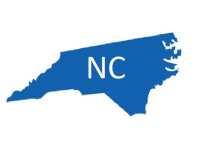 I am saddened to announce, for those of you that do not know, that unfortunately the proposed North Carolina intrastate crowdfunding act (the NC JOBS Act, originally HB680) is officially dead… at least for now. The proposed bill originally passed the North Carolina House by an almost unanimous vote (103 to 1) but failed to pass a Senate vote earlier this month (47-54 against). The belief is that bill failed in the Senate because legislators attempted to bundle the proposed intrastate crowdfunding exemption with certain other unrelated and unfavorable legislation. As noted on the exemption proposal website:
I am saddened to announce, for those of you that do not know, that unfortunately the proposed North Carolina intrastate crowdfunding act (the NC JOBS Act, originally HB680) is officially dead… at least for now. The proposed bill originally passed the North Carolina House by an almost unanimous vote (103 to 1) but failed to pass a Senate vote earlier this month (47-54 against). The belief is that bill failed in the Senate because legislators attempted to bundle the proposed intrastate crowdfunding exemption with certain other unrelated and unfavorable legislation. As noted on the exemption proposal website:
“The The Senate leadership tried repeatedly to attach other more controversial legislation to the NC JOBS Act, and each of those attempts failed either in the Senate or when sent back to the House. The final attempt today was a bill entitled H1224, which bundled together 6 other provisions for sales taxes and corporate welfare along with the JOBS Act, and was also tied to two other bills that would provide amendments to H1224 if it was passed. A very contentious debate about the other provisions in the bill raged over the last week between the Senate and the House, in committees, and in the caucuses, with the ultimate result a final vote today of 47-54 against the bundled bill. This was the final bill to be considered by the legislature for the current session, which will adjourn tomorrow.”
provisions in the bill raged over the last week between the Senate and the House, in committees, and in the caucuses, with the ultimate result a final vote today of 47-54 against the bundled bill. This was the final bill to be considered by the legislature for the current session, which will adjourn tomorrow.”
In preparing my proposed Illinois intrastate crowdfunding bill, I had several discussions with the team who put the North Carolina bill together, including Mark Easley Michael O’Brien. I know how hard the individuals worked to get as far as they did and it is a shame to see those efforts wasted by short sighted politicians. Per Mr. O’Brien, the intent is to reintroduce the proposed intrastate crowdfunding as soon as possible and I can only hope that they have better luck when they do.
DISTRICT OF COLUMBIA – Well that makes Two of Us!
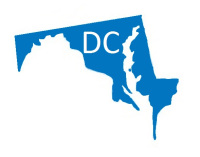 On August 8th, the Department of Insurance, Securities and Banking (DISB) published a set of proposed rules which would create a D.C. intrastate crowdfunding exemption. As a recap, the proposed rules allow for issuers to raise up to a maximum of: $2,000,000 (if they provided independently audited, GAAP based, financials); $1,000,000 (if they provided independently reviewed, GAAP based, financials); or $500,000. The rules also provide investment caps for individual investors of: $10,000 (if the purchaser’s annual gross income is less than $100,000); or $25,000 (if the purchaser’s annual gross income is less than $200,000).
On August 8th, the Department of Insurance, Securities and Banking (DISB) published a set of proposed rules which would create a D.C. intrastate crowdfunding exemption. As a recap, the proposed rules allow for issuers to raise up to a maximum of: $2,000,000 (if they provided independently audited, GAAP based, financials); $1,000,000 (if they provided independently reviewed, GAAP based, financials); or $500,000. The rules also provide investment caps for individual investors of: $10,000 (if the purchaser’s annual gross income is less than $100,000); or $25,000 (if the purchaser’s annual gross income is less than $200,000).
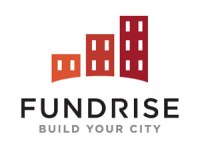 The comment period for these rules expired on September 6th with only two people choosing to provide comments; one of which however, was Fundrise. In a letter dated August 29, 2014 from Benjamin Miller, of Fundrise, to Ms. Lilah R. Blackstone, Assistant General Counsel of the DISB, Mr. Miller professed Fundrise’s support of the proposed legislation saying:
The comment period for these rules expired on September 6th with only two people choosing to provide comments; one of which however, was Fundrise. In a letter dated August 29, 2014 from Benjamin Miller, of Fundrise, to Ms. Lilah R. Blackstone, Assistant General Counsel of the DISB, Mr. Miller professed Fundrise’s support of the proposed legislation saying:
“In our view, the objectives of intrastate crowdfunding objectives are to encourage entrepreneurship and job growth, while providing small business operators with opportunities to engage the community in a meaningful economic way. The Proposed Rulemaking continues this tradition by striking the appropriate balance between lessening the regulatory burdens applicable to small businesses seeking to raise capital from their local communities, and providing adequate investor protections.
“We believe that the future of small business finance will be found in local communities, with local investors and local regulators, and view the Proposed Rulemaking as a strong statement by the Department that the District of Columbia intends to continue leading the way on investment crowdfunding.
“For the foregoing reasons, we fully support and encourage the adoption of the Proposed Rulemaking.
While the proposed rules have some minor bugs as noted in my post (Well, Look Who Decided To Join The Party?? – The DISB Proposes Washington D.C. Intrastate Exemption) it will be interesting to see where these rules go from here and if they have the support to really move forward to the point of being enacted.
WISCONSIN – Where Beer is Making Crowdfunding Go Down Easier
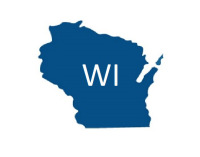 In Wisconsin, start-ups are very excited about the recently live Wisconsin intrastate crowdfunding exemption allowing for “equity based” crowdfunding. In particular, it seems to have piqued the interest several “craft beer” start-ups who hope to be able to use the exemption to help fill the growing funding gap in Wisconsin for these types of ventures. As noted in a recent article, MobCraft Beer, a craft brewery in Madison, recently became the first issuer in Wisconsin to get approval from regulators to use equity crowdfunding. Henry Schwartz, co-founder and president of MobCraft, was quoted as saying:
In Wisconsin, start-ups are very excited about the recently live Wisconsin intrastate crowdfunding exemption allowing for “equity based” crowdfunding. In particular, it seems to have piqued the interest several “craft beer” start-ups who hope to be able to use the exemption to help fill the growing funding gap in Wisconsin for these types of ventures. As noted in a recent article, MobCraft Beer, a craft brewery in Madison, recently became the first issuer in Wisconsin to get approval from regulators to use equity crowdfunding. Henry Schwartz, co-founder and president of MobCraft, was quoted as saying:
 “There’s such a capital crunch in Wisconsin, and people are a little apprehensive to invest in startups. So this is a great way for companies to start the first round, and then be able to attract some higher dollar-amount investors down the road.”
“There’s such a capital crunch in Wisconsin, and people are a little apprehensive to invest in startups. So this is a great way for companies to start the first round, and then be able to attract some higher dollar-amount investors down the road.”
Specialized crowdfunding portals such as CraftFund, are catering to the growing number of craft beer start-ups like MobCraft looking for crowdfunding dollars. That being said, a minor glitch in the Wisconsin intrastate crowdfunding exemption itself is slowing (if not  stalling altogether) the viable use of the exemption.
stalling altogether) the viable use of the exemption.
Wisconsin’s intrastate crowdfunding exemption (like certain other states) requires that the escrow agent, which is required to hold investment funds until the crowdfunding offering is complete, must be a financial institution which is chartered within the state. This wording excludes outside banks and other escrow companies from acting as escrow agent leaving local only banks that either cannot grasp the concept or are simply unwilling to take on the risk.
There has been some talk of the legislation being amended but no formal movement has yet been taken (per my recent discussion with the State of Wisconsin Department of Financial Institutions). In the interim, I am personally working with a company on a way to remedy this issue (and similar issues in other states) and hopefully we will have a solution available soon.
GEORGIA – The Three Year Itch.
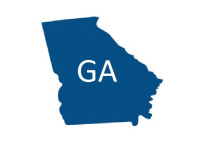 It has been almost 3 years since Georgia took the lead in the intrastate movement by enacting the “Invest Georgia Exemption” which made intrastate crowdfunding possible in Georgia. So how is crowdfunding going in Georgia? … Slow and steady is the overriding opinion but Georgia entrepreneurs and crowdfunding supporters are optimistic as to its viability.
It has been almost 3 years since Georgia took the lead in the intrastate movement by enacting the “Invest Georgia Exemption” which made intrastate crowdfunding possible in Georgia. So how is crowdfunding going in Georgia? … Slow and steady is the overriding opinion but Georgia entrepreneurs and crowdfunding supporters are optimistic as to its viability.
Since its enactment in December of 2011, only 35 companies have registered with the state to participate in intrastate crowdfunding, but why? Most believe the low number is simply a matter of there being a general lack of awareness and/or understanding by businesses and investors as to of what equity/debt based crowdfunding really is. Like any new technology, educating the public is often the biggest stumbling block to acceptance. Similarly, investors also appear somewhat skittish about handing over personal financial information to crowdfunding portals in connection with equity/debt based crowdfunding. Again this is seen generally as a matter of investors still not trusting the technology.
Vincent Russo, the Georgia Secretary of State’s general counsel when the Invest Georgia Exemption was created, said “plenty of small companies could use it but have to find the crowd. It has taken longer than I would have liked, or than anybody would have liked, but Georgia is leading the conversation.” Georgia businesses and crowdfunding supporters are currently trying to boost interest and awareness of equity/debt based crowdfunding. Well-known investor Knox Massey, Managing Partner of Keith-Massey Family Investments, recently founded a MeetUp group in the Atlanta area which is focused on educating companies on how crowdfunding might benefit them. Most attendees know little about Georgia’s exemption to start but “that’s to be expected with any new form of financing,” said Massey.
So where does Georgia go from here? Georgia crowdfunding supporters such as Massey are confident that the rising overall popularity and acceptance of equity/debt crowdfunding as a viable source of funding will lead to an increase in the number of companies taking advantage of Georgia’s exemption. This, coupled with individual efforts such as those of Massey, are expected to result in a significant uptick in companies taking advantage of the Invest Georgia Exemption over the next couple years. As the mother of the intrastate crowdfunding movement it is encouraging to see that, while off to a somewhat slow start, use of the exemption is alive and well and building steam.
NEW MEXICO – New Proposed Exemption
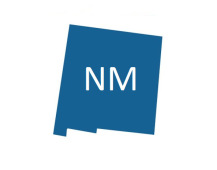 On September 24th, New Mexico’s Securities Division Director, Alan R. Wilson, proposed rules to allow for an intrastate crowdfunding exemption in New Mexico. The proposed intrastate crowdfunding exemption rules were set forth in a letter from Director Wilson to Dora M. Dominguez, Director of the Director of Office of Business Advocacy of the New Mexico Economic Development Department (NMEDD).
On September 24th, New Mexico’s Securities Division Director, Alan R. Wilson, proposed rules to allow for an intrastate crowdfunding exemption in New Mexico. The proposed intrastate crowdfunding exemption rules were set forth in a letter from Director Wilson to Dora M. Dominguez, Director of the Director of Office of Business Advocacy of the New Mexico Economic Development Department (NMEDD).
Unlike many other enacted/proposed intrastate crowdfunding exemptions, the New Mexico proposed rules act as an amendment to an existing New Mexico securities exemption for “Small Offerings By Issuers With Local Operations.” This provides for two distinct advantages over may other current enacted/proposed intrastate crowdfunding exemptions: 1) it allows potential New Mexico crowdfunding Issuers to take advantage of the existing $2,500,000 offering cap (which is higher than the offering cap in the majority of the other states); and 2) New Mexico’s existing “Small Offering” exemption does NOT require an issuer to provide reviewed or audited financial statements to investors. The requirement to provide reviewed/audited financial records in connection with crowdfunding offerings has been a source of heated debate, both on an intrastate level and on a federal level under Title III of the JOBS Act, due to the significant increase in cost it creates for the Issuer. As a result, New Mexico’s approach to forgo such financial reporting requirements all together is a bold step forward in my opinion.
with crowdfunding offerings has been a source of heated debate, both on an intrastate level and on a federal level under Title III of the JOBS Act, due to the significant increase in cost it creates for the Issuer. As a result, New Mexico’s approach to forgo such financial reporting requirements all together is a bold step forward in my opinion.
The New Mexico proposed rules also take a different stance on the duties to be placed on the crowdfunding portals themselves. Unlike many other current enacted/proposed intrastate crowdfunding exemptions which treat crowdfunding portals simply as an intermediary for the pass-through of information, deal facilitation, etc., the New Mexico proposed rules task crowdfunding portals with actively taking measures to prevent potential Issuer fraud. These duties include performing certain background and regulatory checks of Issuers and denying portal access to Issuers who are subject to disqualification (pursuant to the proposed rules) and/or who the portal reasonably believes is engaged (or will engage) in fraud or deceit.
For a full analysis, as well as a copy, of the proposed New Mexico intrastate crowdfunding exemption see “HOT OFF THE PRESS - New Mexico Releases Proposed Intrastate Crowdfunding Exemption.” See also “NEW MEXICO CROWDFUNDING - A Response From Director Wilson.”
KENTUCKY – Now At The Starting Gate
 In late August/early September, several articles reported that Representative Steve Riggs of Louisville, Kentucky was in the process of pre-filing legislation to allow for intrastate crowdfunding in Kentucky. Well I can say with certainty that this announcement was somewhat premature.
In late August/early September, several articles reported that Representative Steve Riggs of Louisville, Kentucky was in the process of pre-filing legislation to allow for intrastate crowdfunding in Kentucky. Well I can say with certainty that this announcement was somewhat premature.
I had a chat with Representative Riggs a week or so ago and it is true that he is a big supporter of intrastate crowdfunding. It is also true and intends to file legislation to allow for intrastate crowdfunding in Kentucky. He did however admit that his staff had not yet completed the  proposed crowdfunding legislation and that they were not yet in a position to file any legislation.
proposed crowdfunding legislation and that they were not yet in a position to file any legislation.
From our discussions, I can say that his intent is (or was as of our conversation) to model his bill after Indiana’s intrastate crowdfunding legislation which recently went live. For those that do not recall, Indiana’s legislation is relatively straight forward; allowing for a maximum offering amount of $2,000,000 (with audited Issuer financial statements, or $1,000,000 without) and a maximum, per investor, cap for non-accredited investors of $5,000 per year. That being said, I sent Representative Riggs, and his staff, copies of the current Enacted and Proposed Intrastate Exemption Summaries and he was very interested in seeing what was happening in states other than Indiana. As a result, there is no telling what the final bill will look like but I have been promised a copy as soon as it is finished so as soon as I know you will.
ILLINOIS – “So let it be written; so let it be done!”
 As noted briefly above, I have been working on an Illinois intrastate crowdfunding exemption for some time. After months of waiting, my proposed exemption has finally been formally drafted as a proposed bill. Ok, so maybe its not exactly worthy of Yul Brynner’s famous line from the Ten Commandments above, but I think its monumental nonetheless so deal with it.
As noted briefly above, I have been working on an Illinois intrastate crowdfunding exemption for some time. After months of waiting, my proposed exemption has finally been formally drafted as a proposed bill. Ok, so maybe its not exactly worthy of Yul Brynner’s famous line from the Ten Commandments above, but I think its monumental nonetheless so deal with it.
For a full analysis, as well as a copy, of my proposed Illinois intrastate crowdfunding exemption see “OFFICIAL DRAFT – Illinois Proposed Intrastate 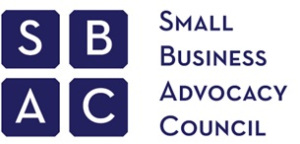 Crowdfunding Exemption.” While it is currently without a sponsor, I have recently teamed up with the Illinois Small Business Advocacy Counsel (SBAC) to move my proposed Illinois intrastate Exemption bill forward. Currently and we hope to have a sponsor soon.
Crowdfunding Exemption.” While it is currently without a sponsor, I have recently teamed up with the Illinois Small Business Advocacy Counsel (SBAC) to move my proposed Illinois intrastate Exemption bill forward. Currently and we hope to have a sponsor soon.
CONCLUSION.
Intrastate crowdfunding continues to move forward and grow in popularity in many states. There are a lot of people who believe that intrastate crowdfunding will die out once (or if) final Title III crowdfunding rules are released but I disagree. State level offering caps tend to be higher (generally $2,000,000 and above) and the compliance requirements are significantly less than what is expected to be required for Title III based crowdfunding. There have been growing pains and speed bumps for certain, but intrastate exemptions ARE being used and I believe they will find there place as a viable source of funding for many issuers in the future.


Pingback: STATE OF THE STATES – An Update On Intrastate Crowdfunding (February, 2015) | CROWDFUNDINGLEGALHUB.com